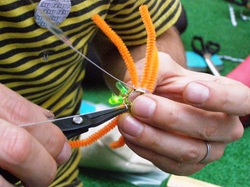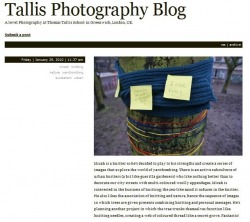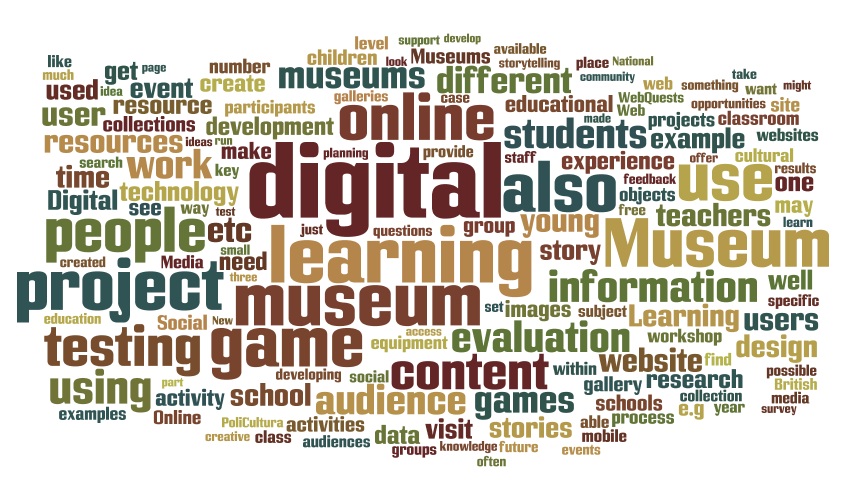|
I'm just wrapping up some research for a museum. They asked me to collate case studies of good and innovative practice in how comparable venues (which in this case include medium-large scale museums and galleries) use digital technology to support school visits, in workshops, self-directed studies and potentially back in school.
They also wanted to find out about the ways such activity can be evaluated. They absolutely do not want to have form after form handed to teachers and students, and wondered how else really good evaluation might take place. The brief contains phrases like blended learning and e-learning. It's problematic because there are no clear definitions of what those are and where they start and end, And it's a real rabbit hole - an entire and massive area of specialisation and expertise. It's a small piece of work, just skimming the surface to help the museum think in new and different ways about what they might do, and how to monitor its impact well. I've collated 64 pages, over 32,000 words, of case studies of applications, programmes, projects, reviews and industry expertise opinions on contextual issues such as evaluation, future proofing and general good practice in digital learning and engagement. I've visited more websites, read more conference papers, searched more forums than I can count and interviewed some really insightful and inspiring colleagues in the field. Eventually, if the museum in question has no objections, I'll upload the collated set of case studies and expertise here for anyone else who might like it. It will be in a very rough and ready format - just my research notes really, in no particular order. But it may be of some help to someone so watch this space... In the meantime, it seemed much easier to put all 32k+ words into wordle and see what happened. There it is above, that's what the whole shebang amounts to. Interesting at this stage that 'online' is so prominent, given that I wasn't specifically looking at just online options. Interesting too that if 'conversation', 'collaboration' or 'participation' are in there, they certainly don't jump out.
0 Comments
 I was asked to chair a panel at this year's Future Everything conference. The theme of the session, provided by the conference programmer, was 'Post Craft'. Three makers and designers of very different sorts were hunted down by the programmer and lined up as the panel. I've never chaired a panel before but this year I'm saying yes to new things, to push my comfort zone a little. It's fair to say I was more than a little nervous, which I countered by going into hyper-organised mode. It seemed to work, once we took to the platform the nerves disappeared and the session flowed. I felt it important to start by asking if there was such a thing as Post Craft because if there is, I had no idea what it is. (If you're wondering, we all seemed to agree there probably isn't such a thing). The event was attended by a very digi-savvy crowd so I looked up the tweets about it afterwards to try and see if there was any feedback about how people thought it had gone. Luckily the responses was positive. To try and capture some of the conversation I set up a little mini-site pulling together the panel, the questions asked, and the responses on twitter. You can find it all here.  Manchester Beacon for Public Engagement (with whom I work, as part of their evaluation group) are looking for creative producers / documenters to record some of their outcomes of their work... TENDER FOR CREATIVE SUPPORT TO CAPTURE AND PROMOTE LEARNING FROM UNIVERSITY-COMMUNITY PUBLIC ENGAGEMENT PILOT PROJECTS Deadline 2pm 27th August THE PROJECT The Manchester Beacon seeks creative producer(s), organisation or consortia of creative practitioners to work alongside upto 10 collaborative pilot projects to help capture and promote the learning, benefits and impact (the difference a project made). Each pilot project involves university staff (researchers/ staff/ postgraduate students) working with community/ (not-for-profit) partners. We are looking for resourceful, people-focussed producers skilled at creating engaging narratives using media-based tools and techniques to produce a portfolio of stories to document the challenges, successes and lessons learned from project activity and collaborative working. Applicants are encouraged to present approaches that present a learning opportunity for participants to engage in the process and use media to disseminate their stories themselves beyond the life of the projects. About four years ago I was asked to work as cultural and educational consultant for a Culture Online funded pilot project called MyArtSpace. We worked with three venues - Urbis in Manchester, The Study Gallery, now KUBE, in Poole and the D-Day Museum in Portsmouth. MyArtSpace was one of the early systems for interpreting and sharing collections and exhibitions digitally using mobile phones. Organisations listed exhibits or artefacts on a database, along with images and interesting facts. These were then transferred to a system which visitors could access via specially programmed mobile phones.
As visitors encountered an object showing a code around the venue or site, they entered the code into the phone, which brought up a corresponding image and information. Visitors could then take a photo, record sounds, and add additonal notes, thoughts, facts etc to this object's 'record.' This was then saved to a personalised storeroom belonging just to that one visitor, which they accessed on the internet later on. Through their collection in this on line storeroom they could then select, order, and present items to create unique exhibitions; then share them with other users through the MyArtSpace website. After the pilot phase, MyArtSpace became OOKL as we realised the potential for the service expanded way beyond just art, and we didn't want to restrict usage. Museums, botanic gardens and a wide range of other spaces and places began to come on board. Now, with leaps and bounds of advances in digital technology and a web revolution, the power of OOKL has stepped up to gears previously incomprehensible. January saw an i-phone app launched which has opened up access to the service and its thousands of objects. More than three venues per week are now signing up to use OOKL. If you want to find out more about using OOKL as a venue or a visitor, read on...  "Micah is a knitter" That was about all we knew from the tweet on creativetallis twitter stream but it was enough to hook me. CreativeTallis is a part of one extraordinary school's social media activity I've been following for some time now. Most schools now have something called a Virtual Learning Environment. It's a bit like an intranet but with some real web functions like blogging and podcasting. Personally I don't quite understand their purpose. If you want young people to experience the potential of broadcasting and publishing their work 'out there' then in my view the internet is the better way to do it. I appreciate schools have a responsbility for safety, which means many still sit behind resilient local authority firewalls with not much of the real world getting in or out. But if young people are going to access the web anyway in their own time, and they are, is it not more responsbile to help them understand how to do that safely, rather than pretend the world wide web isn't really there? And so CreativeTallis (actually Thomas Tallis school in London) is a leader in this approach for schools in my view. They present a range of websites, blogs, twitter streams, webcasts and more. In the past I've watched them create a 3D city-scape thorugh a live webcast, and been able via twitter, to ask them questions about what they were doing and why, and have students reply to my questions in real time. Through this kind of innovative approach, the school is able to demonstrate how students learn with a passion and excitement, stimulating curiosity and sharing, celebrating and exploring individuality. Importantly students are encouraged to help steer and develop their own learning, and have the know-how to recognise and reflect on their experiences. And so it is I knew that unusually, Micah is a knitter, would be the starting point to find out more about one student's experience of education. Micah is also a person, an individual, and knows how to celebrate that thanks to the realistic, practical, relevant, yet utterly 'out-there' work of his school. |
Details
...BlogI'm most interested in how the public, your public, whoever that may be, engages with culture and creativity.
And if it nurtures creativity and develops personal, social or professional skills I'm absolutely all ears. Categories
All
Archives
May 2023
|




 RSS Feed
RSS Feed
